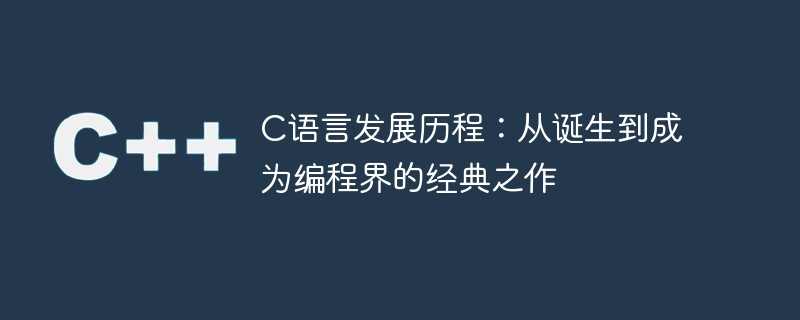

C language is a high-level programming language widely used in the field of computer programming, and it is also a classic in computer science. This article will lead readers to understand the development history of C language, from its birth to gradually becoming a standard in the programming world.
The history of the C language can be traced back to the early 1970s. At that time, due to the continuous development of computer hardware and the advancement of computer science, there was an increasing demand for a more efficient programming language. This has also led to the emergence of a series of high-level programming languages, including C language.
The C language was first developed at Bell Labs in the 1970s by Dennis Ritchie of Bell Labs. Initially, the C language was born as a tool for writing efficient and portable programs for the Unix operating system. Because C language adopts concise syntax and powerful functions, it quickly attracted widespread attention. The development of the C language also benefited from the popularity of the Unix operating system, because the close integration between the C language and the Unix system has made it the standard programming language in the Unix system.
During the development of the C language, two outstanding computer scientists, Brian Collingham and Dennis Ritchie of Bell Labs, published "The C Programming Language" in 1978. This book is widely regarded as the bible of the C language. It details the basics of C language syntax, data types, and control flow. The publication of this book further expanded the influence of C language, causing more and more programmers to start learning and using C language.
Over time, C language has gradually become a mainstream programming language in academia and industry. Its wide application is mainly due to its powerful functions and portability. C language has rich library functions, allowing programmers to easily develop various applications. The portability of the C language allows it to run on different computer platforms, which greatly improves developers' work efficiency.
With the continuous development of C language, people began to put forward some ideas to improve C language. Therefore, in the late 1980s and early 1990s, the C language and the extended standard of the C language-ANSI C appeared. The C language was developed on the basis of the C language. It adds object-oriented features to the C language. ANSI C is to provide a standard C language specification to facilitate compatibility and communication between different compilers.
The development of the C language continues, including the release of new versions such as C11 and C18. These new versions further improve the functionality and expressive capabilities of the C language by introducing new features and improvements. At the same time, C language has also been widely used in fields such as embedded systems, operating systems, and game development. It can be said that C language has become a classic in computer science.
To sum up, C language has experienced many years of development and evolution from its birth to becoming a classic in the programming world. It plays an important role in the field of computer programming with its simplicity, power and portability. With the continuous advancement of technology, C language is constantly developing and updating to adapt to new needs and challenges. I believe that C language will still play an important role in the future computer programming world.
The above is the detailed content of The history of C language: from its birth to becoming a classic in the field of programming. For more information, please follow other related articles on the PHP Chinese website!




